Session Information
Session Type: Abstract Submissions (ACR)
The Association of PPM1A with Inflammasome Activation in Ankylosing Spondylitis
Background/Purpose
Ankylosing spondylitis (AS) is a chronic inflammatory disorder usually affecting axial skeleton and joints. The pathogenesis and mechanism of inflammatory response in AS, however, remains not fully understood. Recently, it has been suggested that AS could be associated with autoinflammatory responses, which are driven by innate immunity through inflammasome activation. We have reported that immunity to protein phosphatase magnesium-dependent 1A (PPM1A), which regulate BMP and Wnt signaling, are associated with AS. In this study, we try to investigate the association of PPM1A with inflammatory response in AS and its role in the inflammasome activation.
Methods
The concentration of PPM1A was measured in the plasma from AS, rheumatoid arthritis (RA) and healthy control (HC) subjects by enzyme-linked immunosorbent assay (ELISA), and addressed the association with inflammatory burden including disease activity in AS patients. Next, the expression of intracellular PPM1A was evaluated in the synovia from patients with AS, RA and osteoarthritis and in peripheral blood mononuclear cells (PBMCs) from patients with AS, RA and HC. To know the role of PPM1A in the inflammasome activation, the production of IL-1b and expression of active caspase-1 were measured with or without PPM1A knockdown in the macrophage. The expression of PPM1A was evaluated after stimulation with various cytokines.
Results
The levels of PPM1A were significantly higher in the plasma of AS patients compared with RA or HC subjects. In addition, there was significant correlation between the levels of PPM1A in plasma and the values of BASDAI, ESR and CRP in AS patients (Figure 1). The expression of PPM1A in the synovia and PBMCs were elevated in AS. Further, IL-1b secretion and activation of caspase-1 was significantly decreased by knockdown of PPM1A. Finally, the expression of PPM1A was enhanced by stimulation with TGF-b in the macrophage.
Conclusion
Our present study suggested that inflammasome activation could be regulated by intracellular PPM1A, which contribute to the pathogenesis of inflammatory responses in AS.
Figure 1. Correlation between BASDAI (a), CRP (b) and the levels of PPM1A in the plasma of patients with AS
Disclosure:
S. M. Ahn,
None;
S. H. Bae,
None;
S. Hong,
None;
E. J. Lee,
None;
E. J. Lee,
None;
E. J. Chang,
None;
D. H. Lim,
None;
Y. G. Kim,
None;
C. K. Lee,
None;
B. Yoo,
None.
« Back to 2014 ACR/ARHP Annual Meeting
ACR Meeting Abstracts - https://acrabstracts.org/abstract/the-association-of-ppm1a-with-inflammasome-activation-in-ankylosing-spondylitis/

